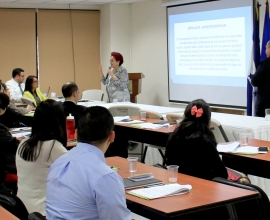Honduras makes progress in the process of approving a personal data protection law
The Honduran Institute for Access to Public Information, with the support of EUROsociAL, shared the law with civil society and the Honduran public administration as a preliminary step before presenting a popular initiative before Congress
The Honduran Institute for Access to Public Information, with the collaboration of the EUROsociAL Programme, financed by the European Union, held a workshop to share its draft Law on Protection of Personal Data with institutional representatives of civil society and of the Honduran civil service.
Important figures from Honduran public institutions and civil society attended the workshop. Noteworthy attendees included representatives from the National Commission on Human Rights, National Congress, Attorney General's Office, Supreme Court of Justice, Supreme Electoral Court, National Registry of Persons, Secretariat of Education, Property Institute, Honduran Telecommunications Company, Bar Association, Association of Media, Federation of Chambers of Commerce, and Association of Private Universities, among others.
In addition, the event was attended by a sizeable delegation from the Institute for Access to Public Information, headed by its President and two commissioners; from the EUROsociAL Programme, represented by Willy Hick, Attaché for Cooperation of the European Delegation in Honduras; Fernando de la Cruz, representative of the CEDDET Foundation; and Javier Puyol, the international expert responsible for the entire process of legal advising in the drafting of the law.
The activity had two major objectives: on the one hand, to present to Honduran society the draft law that the Institute has been working on for the past two years; and on the other, to enrich this proposal with the suggestions and specific recommendations from each of the sectors involved. Given the length and complexity of the law, sectoral meetings with different institutions were planned to make it possible to study specific aspects of the text in depth.
Specifically on 5th and 6th March, the IAIP and EUROsociAL teams met with representatives of the Supreme Electoral Court, the Office of the National Registry of Persons, the Banking and Insurance Commission of the Bank of Honduras, and the Bureau of Credit and Financial Solvency. Throughout the month of March, other meetings are anticipated with more of the stakeholders to complete the process of sharing and discussing the proposal.
Lastly, in coming months the IAIP will try to collect the 3,000 signatures needed to present, through a popular initiative, the draft law to the Honduran National Congress.
CEDDET

